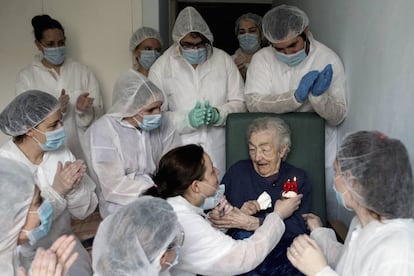Ortega y Gasset Awards honor public service reporting on Covid pandemic and climate crisis
Outstanding work by news outlets from Ecuador, Spain and Nicaragua, including EL PAÍS, was selected on Tuesday by the jury that hands out the most prestigious prizes in Spanish-language journalism

The Ortega y Gasset Awards, the most prestigious prizes in Spanish-language journalism, this year focused on public service stories that covered the coronavirus pandemic as well as the environmental crisis facing the planet.
The winners were announced on Tuesday after the jury met at the headquarters of EL PAÍS, which created the awards in 1984 to recognize outstanding reporting in the Spanish-speaking world.
Isabela Ponce from Ecuador, Mariano Zafra, Javier Salas and Brais Lorenzo from Spain, and Carlos Fernando Chamorro from Nicaragua were the recipients of the 38th edition of a prize named after Spanish philosopher José Ortega y Gasset.
The prize for Best Investigative Reporting went to Las mujeres que ganaron al desierto (or The women who won against the desert), written by Isabela Ponce for the news organization GK, which specializes in stories about the environment, transparency and gender issues. The winning feature describes four women’s struggle to bring water to their crops in a semi-deserted area of Ecuador. The jury underscored “the detailed and precise description of the surroundings of a story about female leadership in a hostile environment.” In the same category, the jury made a special mention of Tres niñas cubanas (or Three Cuban girls), a story by Carlos Manuel Álvarez that was published in the Cuban magazine El Estornudo.

In the Best Multimedia Coverage category, the winners were Javier Salas and Mariano Zafra, who work for EL PAÍS, for their highly visual explanation of how the coronavirus expands through aerosols, also available in English: A room, a bar and a classroom: how the coronavirus is spread through the air. The journalists used visual narratives to provide a very simple explanation of how simple health measures can contain coronavirus transmission in three very common everyday settings. The feature was viewed by over 12 million people within a few days of its publication, and received praise from many international experts. “This multimedia report not only changed lives, it saved them. At a time when there was no efficient information-sharing on how aerosol transmission works, it was of great use to millions of readers. It is the perfect expression of public service reporting that helps make decisions,” said the jury, noting that the feature was offered in Spanish, English, Portuguese, French and Chinese. There was a special mention for Los confinados (or The confined), a feature coordinated by Albor Rodríguez and Héctor Torres that ran in the Venezuelan news outlet La Vida de Nos.
The photographer Brais Lorenzo, of the Spanish news agency Efe, won in the Best Photograph category for Cumpleaños (or Birthdays), which shows a woman named Elena Pérez celebrating her 98th birthday at a senior residence in Ourense, Galicia. The center had earlier been an infection hotspot for coronavirus. The jury said that the image “conveys everything that happened during the pandemic, but also sends out an idea of hope and that all lives matter.” There was a special mention for Samuel Sánchez, an EL PAÍS photographer, for his hospital series La Paz: a Madrid hospital at war against Covid-19.
The career award went to Carlos Fernando Chamorro, an investigative reporter from Nicaragua who as a young man openly supported the fight to depose the dictator Anastasio Somoza – whose regime murdered his father, the editor of the newspaper La Prensa. Chamorro has worked as a reporter and documentary filmmaker, and he once served as deputy culture minister. He currently heads the news outlet Confidencial and hosts the TV show Esta Semana. Last week, the police raided the headquarters of both news organizations for the second time, taking material away. The jury called Chamorro “an emblem of the defense of freedom of expression.”
The jury was made up of Jordi Amat, a writer; Beatriz Corredor, president of the energy group Grupo Red Eléctrica; Isabel Peña, a screenwriter; Borja Sémper, director of Institutional Relations at EY; Raquel Yotti, director of the Carlos III Health Institute; Javier Moreno, editor-in-chief of EL PAÍS; Carlos Yárnoz, the Ombudsman at EL PAÍS, and Ana Pantaleoni, head of EL PAÍS’ Catalonia bureau.
The winners will take home a cash prize of €15,000 and a sculpture by the Basque artist Eduardo Chillida.
English version by Susana Urra.
Tu suscripción se está usando en otro dispositivo
¿Quieres añadir otro usuario a tu suscripción?
Si continúas leyendo en este dispositivo, no se podrá leer en el otro.
FlechaTu suscripción se está usando en otro dispositivo y solo puedes acceder a EL PAÍS desde un dispositivo a la vez.
Si quieres compartir tu cuenta, cambia tu suscripción a la modalidad Premium, así podrás añadir otro usuario. Cada uno accederá con su propia cuenta de email, lo que os permitirá personalizar vuestra experiencia en EL PAÍS.
¿Tienes una suscripción de empresa? Accede aquí para contratar más cuentas.
En el caso de no saber quién está usando tu cuenta, te recomendamos cambiar tu contraseña aquí.
Si decides continuar compartiendo tu cuenta, este mensaje se mostrará en tu dispositivo y en el de la otra persona que está usando tu cuenta de forma indefinida, afectando a tu experiencia de lectura. Puedes consultar aquí los términos y condiciones de la suscripción digital.








































